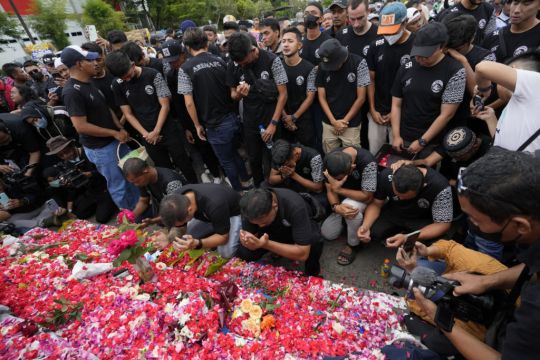Indonesian police said they are investigating more than a dozen officers responsible for firing tear gas at a football match, sparking a crush that killed 125 people.
The announcement came as distraught family members struggled to comprehend the sudden loss of loved ones at the match in East Java’s Malang city that was watched only by hometown Arema FC fans.
Organisers had banned visiting Persebaya Surabaya supporters at the Kanjuruhan Stadium due to Indonesia’s history of violent football rivalries.

Witnesses said home fans flooded onto the pitch after Arema lost 3-2 to Persebaya, ending a 23-year unbeaten home record against the visitors.
Some of the 42,000 Arema fans threw bottles and other objects at players and officials. At least five police vehicles were toppled and set ablaze outside the stadium.
Most of the deaths occurred when riot police, trying to stop the violence, fired tear gas, including toward the spectator stands, triggering the disastrous crush of fans making a panicked, chaotic run for the exits. Most of the 125 people who died were trampled upon or suffocated.

At least 17 children were among the dead and seven were being treated in hospitals, the ministry of women’s empowerment and child protection said.
Police said 323 people were injured in the crush, with some of them still in a critical condition.
National police spokesperson Dedy Prasetyo said in a news conference that 18 officers responsible for firing tear gas, ranging from middle to high-ranking officers, were being investigated, along with “internal matters related to security management”.

He said police were still questioning witnesses and analysing footage from 32 security cameras inside and outside the stadium and nine mobile phones owned by the victims as part of the investigation to also identify suspected vandals. Two police officers were said to be among the dead.
Arema players and officials laid wreaths on Monday in front of the stadium. “We came here as a team asking forgiveness from the families impacted by this tragedy, those who lost their loves ones or the ones still being treated in the hospital,” head coach Javier Roca said.
Indonesian president Joko Widodo ordered the country’s premier league suspended until safety is re-evaluated and security tightened. Indonesia’s football association has also banned Arema from hosting matches for the rest of the season.
Arema FC dan Aremania adalah keluarga, duka mendalam sangat kami rasakan, semoga yang telah tiada mendapatkan tempat terbaik di sisiNya dan yang ditinggalkan diberikan ketabahan serta kekuatan. Kita lalui bersama-sama.
🤍#aremafc #aremania #SalamSatuJiwa pic.twitter.com/D0tvCddyPF— Arema FC (@AremafcOfficial) October 3, 2022
Arema FC president Gilang Widya Pramana expressed his sadness and his deepest apologies to the victims and the Indonesian people, and said he is ready to take full responsibility for the tragedy.
He said that the management, coach and players were in shock.
“I am ready to provide assistance, even though it will not be able to return the victim’s life,” Mr Pramana said in a news conference at Arema’s headquarters in Malang.
“This incident was beyond prediction, beyond reason … in a match watched only by our fans, not a single rival’s supporter,” he said, sobbing.
“How can that match kill more than 100 people? An incident that probably wouldn’t exist in the world.”

He said that Arema FC was ready to accept any sanctions from Indonesia’s Soccer Association and the government, and “hopefully, it will be a very valuable lesson”.
Security minister Mohammad Mahfud said he will lead a separate inquiry to investigate violations of law over the disaster. The team will also determine what victims’ compensation should be provided and will complete the task in three weeks.
Rights group Amnesty International has urged Indonesia to investigate the use of tear gas at the stadium and ensure that those found in violation are tried in open court.
While Fifa has no control over domestic games, it has advised against the use of tear gas at stadiums.
Despite Indonesia’s lack of international accolades in the sport, hooliganism is rife in the football-obsessed country where fanaticism often ends in violence.
Data from Indonesia’s watchdog, Save Our Soccer, showed 78 people have died in game-related incidents over the past 28 years.







